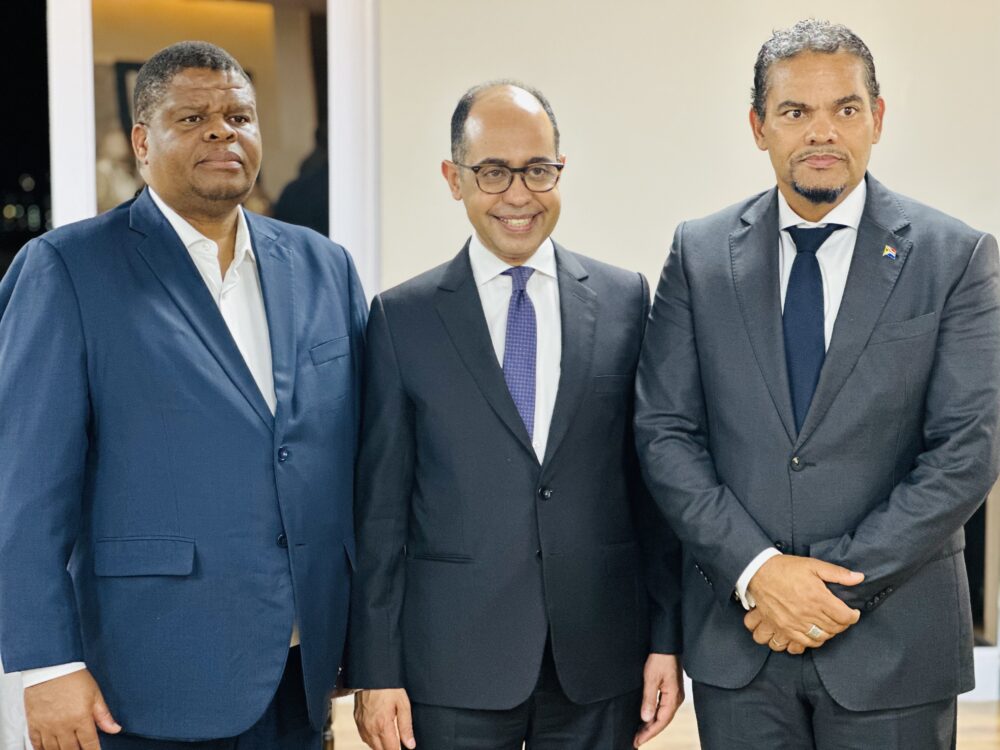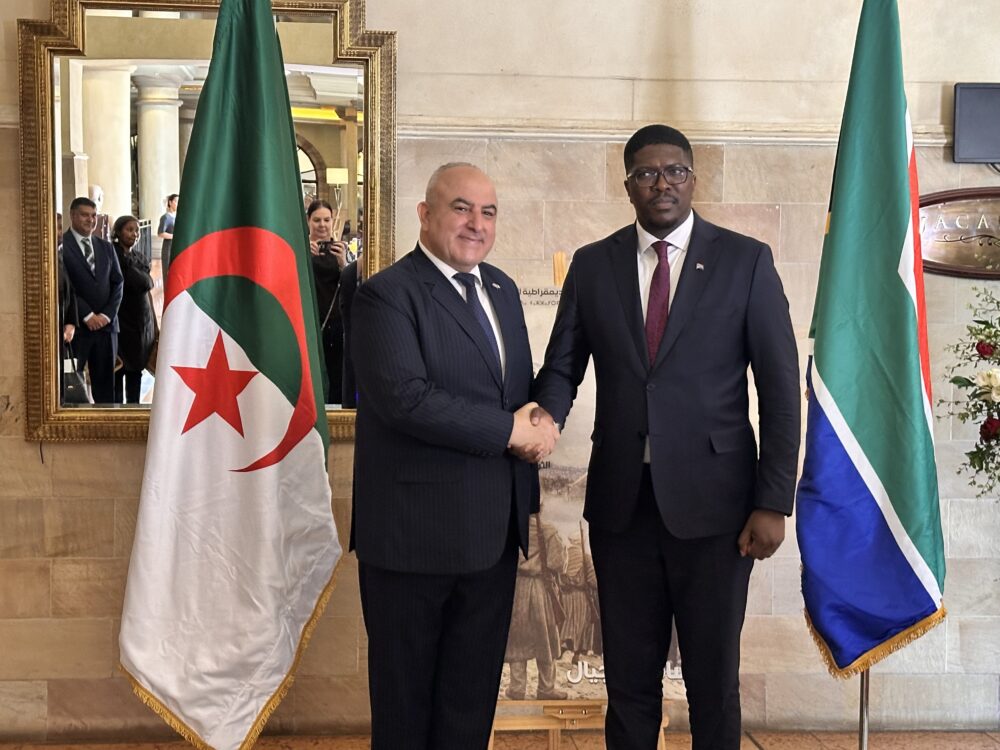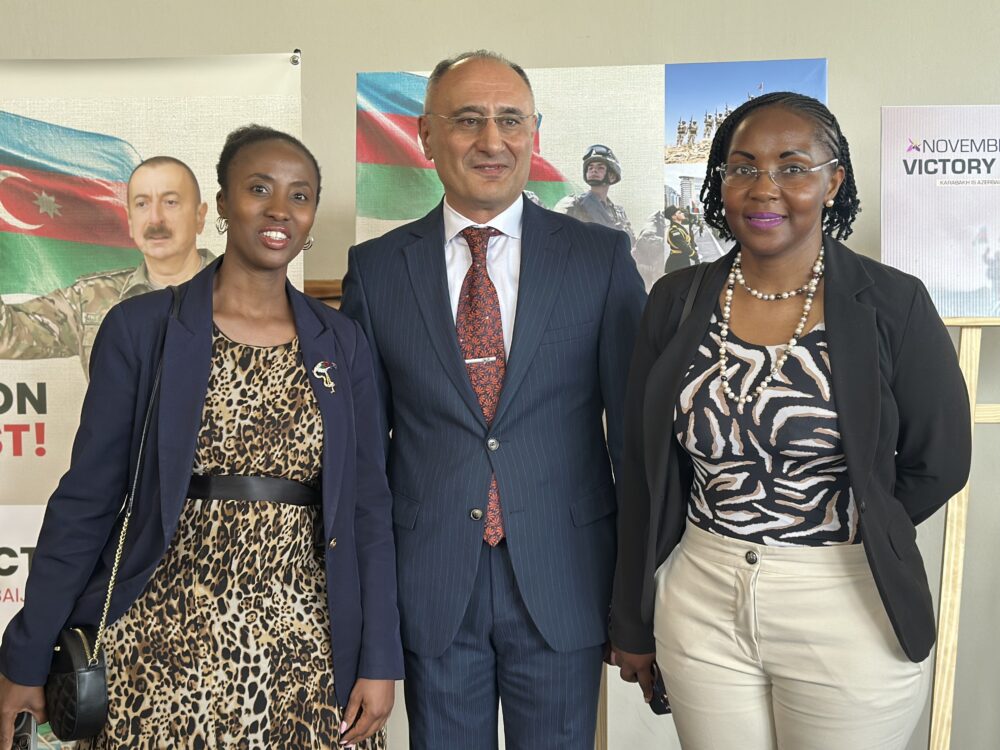From left: Prof Erin McCandless, H.E. Hanan Jarrar (Palestine), H.E. María del Rosario Mina-Rojas (Colombia),
Ms Ayşegül Kandas and H.E. Karima Bardaoui (Tunisia). Photo: Marion Smith
Over the past weeks, South Africa has hosted diplomatic and cultural events that brought together leaders, ambassadors and communities to celebrate peace, heritage and global partnership. From university halls to embassy receptions, the gatherings highlighted the power of dialogue, collaboration and shared history in shaping a more connected world
Women and peace: Diplomacy in a fractured world
At the University of Johannesburg, women diplomats, academics and peacebuilders convened for the roundtable event Women and Peace: Diplomacy in a Fractured World Order. The discussion highlighted the critical yet often under-recognised role of women in shaping peace and diplomacy across conflict and post-conflict contexts.
Ms Ayşegül Kandas, Honorary Professor of Practice at UJ’s Department of Humanities, introduced the guest speakers, which included high-ranking diplomats such as H.E. Hanan Jarrar (Palestine), H.E. Androulla Kaminara (EU/Pakistan), H.E. María del Rosario Mina-Rojas (Colombia), and H.E. Karima Bardaoui (Tunisia).
Moderated by Professor Erin McCandless, the discussion explored how women’s leadership transforms negotiation, mediation and peacebuilding processes. The event underscored the need for inclusive, justice-centred diplomacy.
Research shows that peace agreements are more durable when women are involved, as they broaden the agenda to include justice, community recovery and social cohesion.
The event also marked the 25th anniversary of UN Security Council Resolution 1325 on Women, Peace and Security, which affirmed women’s right to participation in peace and security decisions. Yet the statistics shared during the session revealed slow progress: in 2023, women made up only 9.6% of negotiators, 13.7% of mediators and 26.6% of signatories in peace processes.
Hosted by the SARChI Chair in African Diplomacy and the Qatar–South Africa Centre for Peace and Intercultural Understanding, the roundtable called for renewed global commitment to integrating women’s voices at every level of diplomacy.
Launch of the Grand Egyptian Museum
 From left: Deputy Minister of Water and Sanitation David Mahlobo,
ambassador of Egypt Ahmed Ali Sharif and Deputy Minister of
International Relations and Cooperation Alvin Botes. Photo: Marion
Smith
From left: Deputy Minister of Water and Sanitation David Mahlobo,
ambassador of Egypt Ahmed Ali Sharif and Deputy Minister of
International Relations and Cooperation Alvin Botes. Photo: Marion
Smith
On November 1, South Africa joined the global audience for one of the most anticipated cultural events of the century — the majestic launch of the Grand Egyptian Museum (GEM).
Hosted by the Embassy of Egypt in partnership with the University of South Africa, the live screening at Unisa’s ZK Matthews Great Hall drew diplomats, academics and culture enthusiasts.
The keynote address was delivered by H.E. Alvin Botes, Deputy Minister of International Relations and Cooperation, who praised Egypt’s vision and called the museum “a monumental achievement for Africa and humanity, a bridge connecting our shared past to our collective future”.
Among the distinguished guests were Dr Naledi Pandor, former Minister of International Relations and Cooperation, and members of the diplomatic community, whose presence reflected the strength of Egypt–South Africa relations.
First announced in 1992, the Grand Egyptian Museum has been more than three decades in the making. Construction began in 2005.
The project reached completion in 2023 at an estimated cost of $1 billion. Standing proudly near the Pyramids of Giza, the GEM is now the largest archaeological museum in the world, housing over 100 000 artifacts that chronicle Egypt’s civilisation from prehistory through the Greco-Roman era. Around 20 000 items are being displayed to the public for the first time.
One of the highlights is the complete collection of King Tutankhamun’s treasures, marking the first time all 5 400 artifacts from the pharaoh’s tomb are exhibited together. From his golden mask to chariots and jewellery, the collection offers a glimpse into the grandeur and mystery of ancient Egyptian royalty.
The live broadcast from Cairo was a visual and cultural spectacle filled with music, art and star performances, including the actress Sherihan’s return to the stage after years away.
Algeria’s 71st Anniversary of the War of Liberation
 SISTER NATIONS: Ambassador
Ali Achoui and Deputy Minister
of Transport Mkhuleko Hlengwa.
Photo: Marion Smith
SISTER NATIONS: Ambassador
Ali Achoui and Deputy Minister
of Transport Mkhuleko Hlengwa.
Photo: Marion Smith
The Embassy of Algeria in South Africa hosted a solemn and celebratory reception at the CT Hotel in Pretoria to mark the 71st anniversary of the outbreak of Algeria’s Glorious War of Liberation, which began on November 1, 1954.
Under the leadership of His Excellency Ambassador Ali Achoui, the event brought together dignitaries, members of the diplomatic corps and friends of Algeria to commemorate one of Africa’s most defining struggles for freedom and self-determination.
Among the distinguished guests was Deputy Minister of Transport Mkhuleko Hlengwa, who delivered an address highlighting the enduring bonds between South Africa and Algeria, two nations connected by their shared histories of resistance to colonialism. He praised the Algerian people’s courage and resilience, noting how their victory inspired liberation movements across the continent, including South Africa’s anti-apartheid struggle.
Also present were Dr Nkosazana Dlamini-Zuma, a veteran of South Africa’s liberation movement and long-time ally of Algeria, members of the Oliver Tambo family and representatives from the diplomatic community and civil society.
In his address, Ambassador Achoui reflected on the events of November 1, 1954, when the National Liberation Front launched a coordinated uprising against French colonial rule. The eight-year war that followed claimed more than a million Algerian lives but led to independence in 1962. He emphasised that Algeria’s liberation struggle remained a timeless symbol of unity and sacrifice, guiding the country’s diplomacy and development today.
The afternoon concluded with a video presentation showcasing Algeria’s growing economy and tourism opportunities, reflecting the nation’s continued commitment to strengthening economic and cultural ties with South Africa and the broader continent.
Azerbaijan’s Victory Day Celebration
 From left: Dirco Chief Director of the Eastern Europe and Baltic
Countries Phumzile Mazibuko, Chargé d’Affaires Dr Huseyin Rahimli and
Dirco Director of Eastern Europe Sewela Nkgapele. Photo: Marion Smith
From left: Dirco Chief Director of the Eastern Europe and Baltic
Countries Phumzile Mazibuko, Chargé d’Affaires Dr Huseyin Rahimli and
Dirco Director of Eastern Europe Sewela Nkgapele. Photo: Marion Smith
On November 4, the Embassy of Azerbaijan in Pretoria hosted a celebration to mark Azerbaijan’s Victory Day, an occasion commemorating the country’s triumph, unity and national pride. The event brought together diplomats, government officials, defence representatives and members of the Azerbaijani community in South Africa.
In his welcoming address, Dr Huseyin Rahimli, the Chargé d’Affaires of the Embassy of Azerbaijan, reflected on Victory Day as a powerful symbol of resilience and unity. He described the day as a commemoration of past triumphs and a reminder of the value of peace, stability and international cooperation. Dr Rahimli reaffirmed Azerbaijan’s commitment to strengthening diplomatic, cultural,and defence ties with South Africa and other African nations.
Brigadier General Dion de Vos, Director of Defence Foreign Relations in South Africa, acknowledged the partnership and spoke of the importance of continued dialogue and mutual understanding between the two countries, in maintaining global stability and cooperation.
The celebration reflected the shared values of peace, respect and partnership that underpin Azerbaijan’s global relationships.